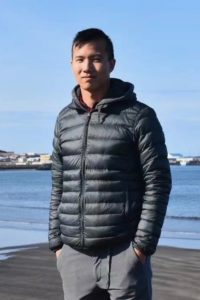Digital Nomad
Q&A with Ken Feng, FSA, MAAA, actuary at Milliman
June 2021Photo: iStock.com/pat138241
In March 2020, when the U.S. financial services industry scrambled to work 100 percent remotely, Ken Feng, FSA, MAAA, an actuary at Milliman, had already been doing it for 18 months. In 2015, at age 24, Ken was among the youngest actuaries to be awarded fellowship in the Society of Actuaries (SOA). Three years later, he gave up his apartment in Chicago and embarked on a journey as a digital nomad, traveling while working as a mergers and acquisitions (M&A) actuary.
“Going back to my childhood, I learned the joy of road-tripping from my parents,” Ken reflects. “They were first-generation immigrants from China, and for most of my youth, we lived in upstate New York, far from the major cities. To meet with old friends or even to purchase Chinese groceries usually entailed long drives to Toronto or New York City. The hours spent in transit—imagining the different worlds passing by outside my window or listening to my own thoughts—nourished the travel bug within me at a young age.”
In this Q&A, Ken shares more about life on the road and what he values in his life and career.
You made a deliberate decision not to climb the corporate ladder. What made you reach that decision, and what did you gain in return?
Two factors were important in deciding that corporate advancement was no longer a priority for me. First, I realized that time is a hopelessly limited resource, and the sacrifices in time spent focused solely on career advancement meant I would not be able to focus on other areas of personal enrichment. Second, I figured out that I had been caught up in a vicious cycle of trying to please others—to the detriment of my personal enrichment—my whole life. By choosing to back off a bit from being laser-focused on career advancement goals, I found more time to dedicate to what I valued rather than what others wanted me to value.
How did you figure out your internal compass?
My internal compass generally points in the direction of higher freedom. The last thing I want is to feel trapped in a particular situation or scenario due to a lack of freedom. There are a few different types of freedom I strive for:
- Financial freedom (i.e., living within my means)
- Physical freedom (i.e., not being tied to living in a single location)
- Social freedom (i.e., living true to yourself and finding the right people as friends)
Once these most basic freedoms are achieved, the rest is a personal lifestyle choice of how to maintain a reasonable balance among the different competing forms of freedom. For instance, I could gain more physical freedom by leaving my job, but then I would lose a lot of financial freedom.
You’ve been to nearly 30 countries since the beginning of your digital nomad journey. What has been the biggest challenge, and what was an unexpected benefit?
The biggest challenge always has been balancing the demands of my job with the temptations of a tourist lifestyle. There have been a number of times when I have spent full days in my room working, leaving only to grab food and water, rather than enjoying the new environment around me. I also am somewhat limited in where I can stay due to my need for privacy and reliable internet connectivity.
An unexpected benefit of my digital nomad lifestyle is that I peculiarly (and quite proudly) travel with only a carry-on bag. My 10 kg backpack, which meets budget airline carry-on requirements, contains my laptop, a few changes of clothes and toiletries. Traveling with so little has taught me how little “stuff” I actually need to lead a meaningful life.
According to the Myers-Briggs Type Indicator assessment, you are INTP (introverted, intuitive, thinking, perceiving). How has that influenced your lifestyle choices?
Living life on the road as a solo traveler makes a lot of sense as an INTP. I had originally feared that by working remotely, I would feel isolated and lonely. But it turns out that I actually came to embrace the solitude while traveling.
I think the intuitive and thinking aspects of my personality make me a bit wiser with decision-making on the road—I have evaded a number of scams—and the perceiving side of me embraces the novelty and chaos of new environments. My travel style might reflect my personality type, too: I prefer going alone on public transit over the strict schedule and camaraderie of a tour group.
You are a voracious reader. What book has had a meaningful impact on your life and/or challenged the way you think about things?
In the past year, I read Henry David Thoreau’s Walden, which I wish I had come across when I was younger. The book follows the lifestyle and thoughts of the 19th century American philosopher while he lived in isolation by a lake. His values and conclusions line up reasonably close to mine at my current stage in life.
Who are your sources of inspiration?
Rather than pointing to famous people, I think it might be interesting to highlight a particular life theme—trying new things. When I was young, I was deathly afraid of trying new things due to the likelihood of failure. Reflecting further, I think a lot of this was due to the lack of encouragement or outright jeering I received from peers, family or friends whenever I awkwardly attempted something new.
Some of the people I appreciate the most in my life are those who are curious, interesting and encourage me to go outside of my comfort zone while being supportive when I am awkward and flailing. Over the years, I have been fortunate enough to befriend a handful of such people, and collectively they have changed my life for the better.
What is your vision/dream for the next five to 10 years?
My hope for the world is to take a step back from the gospel of growth for the sake of growth. In our modern economy, which is dominated by publicly listed corporations, many decisions are made with a short time frame in mind. Nobody should be proud to admit that we are possibly living beyond the planet’s means (and I, a frequent budget airline flyer, have already made my contribution to our carbon footprint).
I hope as a society we can come to accept how every person is different and has unique desires and needs specific to their position—we are not livestock to be herded into feeding from the same trough. I wish that everyone could shrug off the need for social validation and lead a beautiful life where they are true to themselves.
Statements of fact and opinions expressed herein are those of the individual authors and are not necessarily those of the Society of Actuaries or the respective authors’ employers.
Copyright © 2021 by the Society of Actuaries, Chicago, Illinois.


